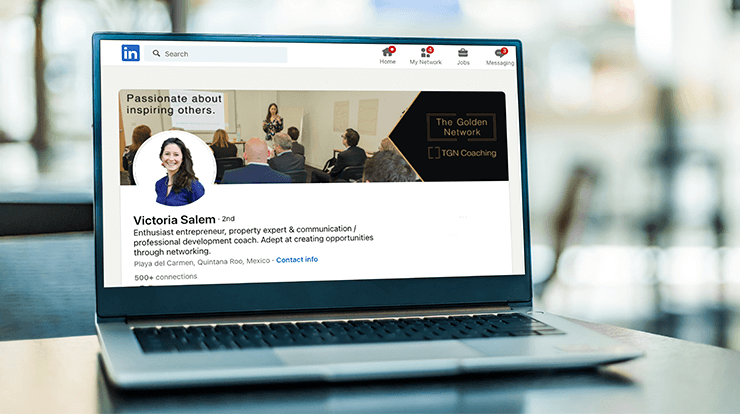Communication is filled with what I call inverse principles—relationships that seem counterintuitive and yet can increase the impact, engagement, and reach of your message. The following four inverse principles will help you with communicating, leading, job searching, and building your brand.
1 Greater Specificity for Greater Universality
Award-winning author and MacArthur “Genius Grant” recipient Jacqueline Woodson says, “The more specific we are, the more universal something can become. Life is in the details. If you generalize, it doesn’t resonate. The specificity of it is what resonates.”
Oyin Egbeyemi, DTM, from Eagle Club in Lagos, Nigeria, agrees. She started learning about the power of greater specificity for greater universality in Toastmasters. Evaluators suggested she add detailed stories to illustrate her points and strengthen her speeches. Once she recognized the principle’s effectiveness, she started applying it to her communication at work.
Egbeyemi is a director and administrator of the Foreshore School, a private school for children ages 3 months to 11 years. Initially, she wasn’t connecting with her staff, which created disagreements. “In holding a leadership position, I realized I can’t speak in generic terms and expect my staff to listen and understand fully,” says Egbeyemi. “If you want to communicate with people about a shared vision, you need to be specific.”
Although not a trained teacher, she leads public speaking classes for students 7–10 years old. She started sharing the lessons she learned in Toastmasters after attending the school’s first graduation ceremony. One of the brightest students presented a speech but never established eye contact with the audience.
Egbeyemi realized the students needed to learn how to speak in front of people. The skill would be even more important when they graduated. “They needed to start speaking—and speaking in detail,” she says.
 Oyin Egbeyemi, DTM, with some of her students.
Oyin Egbeyemi, DTM, with some of her students.For a class assignment, one student presented a demonstration speech on the martial art of tae kwon do. During his talk, the class didn’t understand what he was doing. Egbeyemi could tell he was just giving the presentation to finish the project.
As a result, his audience was disengaged. “I could see on his face that he knew it,” she says. “I said he should stop and explain things.” She asked him to share the details of the moves and what he was doing. He changed his approach, and it worked. At the end of the class, she asked the students if they liked the speech. They said yes!
Accredited Speaker Mohamed Ali Shukri, DTM, from Vision Advanced Toastmasters Club in Manama, Kingdom of Bahrain, is also a strong believer in greater specificity for greater universality. A Toastmasters experience opened his eyes to the principle’s power.
During his second year in Toastmasters, Shukri entered the International Speech Contest. When he competed at the Division level, he described an experience he had with his father. In his speech, he went into great detail about the incident and their journey.
After the contest, a woman approached him. She was shaking. She told Shukri she had that exact experience with her dad. Here was a total stranger with the same story.
“Our lives should be as individual as fingerprints,” says Shukri, “yet they are identical in very weird ways.” Now he incorporates the principle into his work as a trainer and public speaker as founder and CEO of Y Access Training Solutions.
2 Talking to One to Reach More
Another inverse principle that involves specificity is talking to one to reach more. This means it’s best to think about the one person who needs to hear your message and direct your communication to that individual. If you try to appeal to everyone, you will dilute your message and reach fewer people or have an impact on no one. By focusing your message, you reach more people.
Victoria Salem, a former member of Covent Garden Speakers Toastmasters Club in London, is the founder and director of the Golden Network, a company focused on helping individuals communicate better and network with ease. She recommends defining your audience to ensure your message has the most impact. “You should really focus in,” she says. “The more specific, the better.”
 Victoria Salem
Victoria SalemSalem notes that this even applies when engaging on social media. “It is important to talk to one,” she says. “You could have millions of followers, but if they aren’t engaged, you’re speaking to an empty room.”
For Shukri, that one person is actually himself. “It is paradoxically beautiful,” he says. When developing speeches, he’ll consider what was a turning point in his life—something that made a difference to him. He will share that story.
The principle applies to marketing more broadly too. In his Marketing Sage blog, Jeffrey Slater shares his expertise and insights from 30 years in marketing, including work on 100 million brands. He consistently advocates for defining a narrow audience.
In his December 19, 2021, blog post “22 Simple, Straightforward, and Sage Marketing Suggestions for 2022,” Slater writes, “The more specific you can be in who you market to, the better. … The best target audience is a precise individual with a problem you can solve, not a wide swath of the population with general interests.”
3 Fewer Job Applications for Greater Success
Targeting is also important for job searches. This leads to the inverse principle of fewer job applications for greater success.
It’s important to take the time to specifically target your resumes, CVs, and cover letters. That means each one is written for a particular job and couldn’t be submitted anywhere else. When following that approach, you submit fewer applications but increase the likelihood of obtaining interviews. Those fewer but targeted applications will have a higher ratio of success than blanketing employers with generic documents. Based on my 20 years of experience, advising people from more than 43 different countries on job search strategies, tactics, and materials, I know this inverse principle works.
Consider the experience of Brillian S. K., DTM, a member of the Bombay Toastmasters in Mumbai, Maharashtra, India, and the online All Elite Advanced Toastmasters Club. He’s also chief people officer at Times Professional Learning, a company that offers organizations customized learning solutions.
“Our lives should be as individual as fingerprints, yet they are identical in very weird ways.”
—Mohamed Ali Shukri, AS, DTMIn 2010, S. K. began searching for a job that offered new challenges and greater responsibility. He focused on where he knew he fit in and researched those organizations. Next, he identified people he knew who worked at the different companies and talked with them. Then he wrote customized cover letters and CVs for 15 applications. Nine organizations invited him for an interview, and he reached the final stages at all of them. He received two offers and accepted one.
The letters took a lot of time and effort. “It shows you’re serious,” he says. “You’re trying to build a relationship with your future employer.” He recommends a targeted approach to everyone. As a hiring manager, he knows there’s a payoff.
“Sometimes I read through a cover letter and a CV and I don’t understand what the candidate is trying to tell me,” he says. If he receives a generic email or cover letter, he doesn’t read it. If his email address is in the “bcc” of the message or the email is sent to multiple people, he marks it as “read” and moves on.
“On a weekly basis, I have thousands of profiles to review,” says S. K. “People don’t understand that for them it’s just one email, but for the person on the other side, it’s screening through thousands of profiles to match to one job.”
 Brillian S.K., DTM
Brillian S.K., DTMHe remembers one cover letter in particular that used a targeted and strategic approach for a sales position. The applicant started the letter by congratulating S. K.’s company for a recent business win. “It’s rare that people would take the effort to read about the company,” says S. K.
The applicant went a step further by describing why the company’s competitors failed to get the contract and then shared his experience and how he would fit with the company. “The effort the candidate put into the research was impressive and made me consider him,” says S. K. The applicant was hired and is now the head of a unit.
Click play to hear an exclusive podcast interview with professional coach and networking expert Victoria Salem and the hosts of The Toastmasters Podcast. Learn how to supercharge your resume with achievements and skills acquired through Toastmasters.
4 Fewer Platforms to Amplify
The final inverse principle is fewer platforms to amplify your message more effectively. On a micro level, this means it’s better to be active on a smaller number of social media applications and work on deeper engagement than to try and be active on so many that you only have sporadic or superficial engagement. Deeper engagement will create greater success in connecting with people and sharing your message.
Salem recommends starting with the audience and understanding who they are when deciding where to engage on social media. You should also know the answers to the following before becoming active on social media: Who are you speaking to? Why are you talking to them? Where do you find them? How can you best reach out to them?
“Your audience will not be on all platforms,” she says. “You want to select the platform based on who your audience is and the objective you want to achieve.” For her Golden Network company, Salem focuses her social media engagement on LinkedIn.
She notes that different platforms appeal to different age groups. Tone is important too. Is it professional or a more fun or personal message? Will you focus on text, or will images be better for your goals? You also need to know your audience’s WIIFM—What’s In It For Me? What are you offering them?
Click play to hear Victoria Salem talk about the value of building relationships through social media with the hosts of The Toastmasters Podcast.
You want to have an overall goal for your engagement. Then each post will have its own objective that supports the larger goal. “That’s where people make mistakes initially,” says Salem. “They just share without setting a goal.” Once you define your goal, you can measure your engagement and know if you’re achieving success.
On a macro level, fewer platforms to amplify your message more effectively means that if your platform—in this case, your main message or what you stand for—encompasses too many topics or themes, you won’t be memorable. If you try to stand for everything, you won’t be remembered for anything. For example, a political candidate will achieve greater impact by focusing on one main theme. If using too many slogans, the campaign will be less effective.
If you’re not applying these inverse principles already, give them a try. And if you’re already employing them, continue to do so with intention. You will increase your communication’s impact, engagement, and reach, and your message will linger longer.
Jennifer L Blanck, DTM has more than 25 years of career development and advising experience. She is a member of 5-Star Toastmasters Club in Arlington, Virginia, and AAMC Toastmasters in Washington, D.C., as well as a regular contributor to the Toastmaster magazine. Learn more at jenniferlblanck.com



 Previous
Previous

 Previous Article
Previous Article

